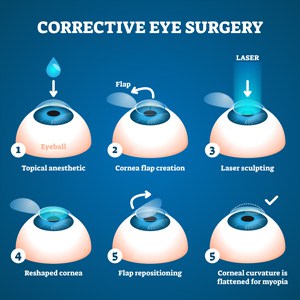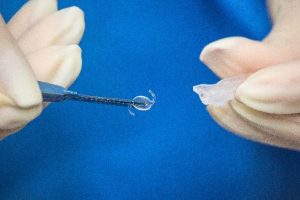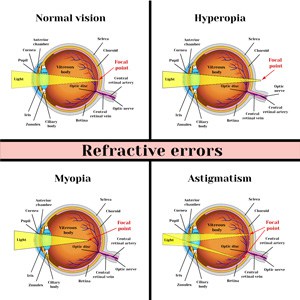Refractive surgery in Boston, and across the globe, should be performed by a surgeon with extensive training and experience. Dr Kornmehl is a leading expert in refractive surgery and laser vision correction. He explains on this webpage how refractive surgery improves vision and whether you should consider this surgery.
What is refractive eye surgery?
Most people are aware that there are new developments in eye surgery intended to reduce dependence on glasses and contact lenses.
Refractive surgery includes several surgical techniques designed to improve problems in focusing the eyes, also known as refractive errors. Until 1989 only glasses or contact lenses could correct refractive problems.
Types of Refractive Errors

Refractive errors are common conditions that prevent light from focusing correctly at the back of the eye. They can occur if the eye has an irregular shape or incorrect curvature or if the eyeball is too long or short. Refractive errors can be diagnosed with comprehensive eye exams. The four most common types of refractive errors are:
Nearsightedness (Myopia)
Nearsightedness occurs when the eye is a little too long or has a cornea that is too steep. This steep cornea causes entering light to focus before it has a chance to reach the retina. While this does not interfere with the eye’s ability to see nearby objects closely, vision becomes blurrier the further away something is. Most people with myopia have it from childhood, with vision getting progressively blurrier until the prescription steadies around the age of 20. It affects 30-40% of Americans.
Farsightedness (Hyperopia)
Farsightedness occurs when the cornea (the clear outer cover of the eye) is too flat. A normal cornea has a curvature that allows light to pass through to the retina, but a flat cornea can cause the light to refract behind the retina, which makes near vision blurry. As with myopia, hyperopia often starts to affect people in childhood and can continue to get worse over time. Farsightedness affects 5-10% of Americans.
Presbyopia
Also known as age-related farsightedness, presbyopia is a condition in which adults gradually lose their ability to see objects up close starting around middle age. Although presbyopia is often confused with hyperopia, they are two separate conditions. Presbyopia occurs because the eye’s natural lens becomes increasingly stiff, hindering its ability to focus on text and other things up close. This condition eventually affects almost all adults, which explains the prevalence of reading glasses among adults over the age of 45.
Astigmatism
Astigmatism occurs when the cornea has a football shape. Instead of having a perfectly rounded curvature for refracting light, the irregularity (and sometimes rough surface) can refract the light in a way that can impact near vision, far vision or both. Astigmatism affects about one in three Americans. Some patients may have nearsightedness or farsightedness in addition to astigmatism.
Types of Refractive Surgery

Refractive errors such as myopia, hyperopia and astigmatism are solved by helping the eye focus light using glasses, contacts or refractive surgery. Refractive surgery techniques aim to change the eye’s focus by changing the shape of the cornea. Dr. Kornmehl reshapes the cornea by removing tissue using a laser; with a flap (LASIK) or without (PRK).
LASIK
LASIK (laser in situ keratomileusis) corrects the curvature of your cornea using an FDA-approved excimer laser. The laser is guided by a Wavefront computer system that maps your eye and measures optical distortions. A microkeratome blade or femtosecond laser creates a flap using the cornea’s surface layer and folds it back. The excimer laser removes a thin tissue layer from your cornea to correct your vision, and the flap is replaced — it re-attaches to the cornea with no stitches required in minutes. LASIK treats myopia, hyperopia and astigmatism.
PRK
Photorefractive keratectomy, or PRK, also uses an excimer laser to reshape the cornea for improved eyesight. Small amounts of tissue are removed from the outer surface of your cornea using a detailed map of your eye’s surface from a computer that calculates the amount of tissue removal precisely. However, PRK does not use a corneal flap. The cornea’s surface layer (epithelium) is removed instead, which requires a bandage contact lens to protect the eye during recovery. PRK treats myopia, hyperopia and astigmatism and may be the better option for someone with severe nearsightedness or thin corneas.
Refractive Lens Exchange

This surgery carefully removes your natural but irregular lens from the eye and replaces it with a premium intraocular lens (IOL). The IOL includes a prescription so that you can overcome nearsightedness, farsightedness or astigmatism without having to rely on prescription eyewear. Dr. Kornmehl offers a variety of IOLs to help you achieve great vision regardless of what combination of refractive errors you have been diagnosed with.
Refractive Cataract Surgery
The purpose of cataract surgery is to remove the eye’s cloudy lens (affected by cataracts) and replace it with an IOL. Many patients decide to use a premium IOL that simultaneously corrects vision since they are replacing the lens anyway. With a premium IOL, you can see more clearly from all distances without having to rely on eyeglasses or contact lenses for most activities. New cataracts cannot grow on these artificial lenses, and the vision improvement should last the rest of your life.
What to Expect During Your Consultation and Preparation for Refractive Surgery

Your consultation will involve a comprehensive eye exam to evaluate your ocular health, eyeglass or contact lens prescription and candidacy for refractive surgery. Dr. Kornmehl may dilate your pupils to reach the most accurate vision measurement and ensure the interior sections of the eye are healthy. Your eyelids may be examined for good tear quality to avoid post-op complications such as dry eyes.
While LASIK is the most common refractive surgery, some people don’t qualify due to thin corneas, severe myopia, dry eye disease or other concerns. PRK may be an alternative option if LASIK isn’t suitable for your vision. However, 30 percent of acceptable LASIK candidates choose to have PRK instead.
You will be asked to prepare for refractive surgery in various ways, including avoiding contact lenses for one or more weeks, depending on the style of contacts you use. You may need to stop taking certain medications or supplements that can interfere with healing. Drink plenty of water to ensure you’re well-hydrated and avoid alcohol the day of your refractive surgery.
Refractive Surgery Recovery
Your recovery will depend on the type of refractive surgery as LASIK and PRK require different healing times. However, you will have blurry vision for several hours after any one of those procedures, so ask a friend or family member to drive you home and help while your vision stabilizes. Many patients can drive themselves to the follow-up appointment the day after refractive surgery.
Dr. Kornmehl will give you detailed instructions for the healing period. When you sleep, you will have to wear protective eyewear to avoid rubbing your eyes for the first week, and prescription and over-the-counter eye drops are necessary to help your eyes heal. Avoid getting water in your eyes for the first week.
Generally, LASIK recovery is shorter than PRK because the eye must regrow the epithelial layer that is removed during the PRK procedure. LASIK offers faster healing because the flap adheres to your cornea within minutes.
When Will I See Clearly After Refractive Surgery?
LASIK patients notice significant improvement in vision the evening of their surgery. PRK patients notice major improvement in their vision immediately after surgery. Vision will worsen for the next two to three days, then improve rapidly. Your eyesight will continue to improve for six months to a year, but much of the healing process is done after three to six months.
What Our Patients Say About Dr. Kornmehl

“I cannot thank Dr. Kornmehl and his staff enough! I went through a longer than anticipated process to get to the point of even having the surgery in the first place. The team was with me every step of the way, giving me the confidence that I was in the best hands possible. I am seeing 20/20 and am so happy to have been under the care of Dr. Kornmehl. If you are even remotely thinking of any type of laser vision correction, please see him immediately.” – Grace L.
“One of the best experiences I’ve ever had with a procedure. Best doctor and the best staff. They take care of you like no other. 10/10 recommend to anyone and everyone! – Bryan T.
“Wonderful experience with Kornmehl Laser Eye Associates. Dr. Kornmehl was an incredible surgeon, and the staff was always helpful and kind. They ensured I had a smooth prep, surgery, and follow-up. I was so lucky that one of the best and most experienced eye doctors in the country took care of me. I am so glad I chose him and would highly recommend to anyone.” – Steph L.
Financing Your Refractive Surgery
Dr. Kornmehl and our experienced medical team provide excellent care for our patients. Many people in the Boston area seek out Kornmehl Laser Eye Associates because of our high patient satisfaction rates and welcoming atmosphere. Financing options are available upon request, so we can help you invest in better vision.
Contact Dr. Kornmehl About Refractive Surgery Today
If you are interested in refractive surgery, schedule your comprehensive eye exam and consultation with Dr. Kornmehl in Boston today. Call (877) 870-2010 to book your appointment at Kornmehl Laser Eye Associates.